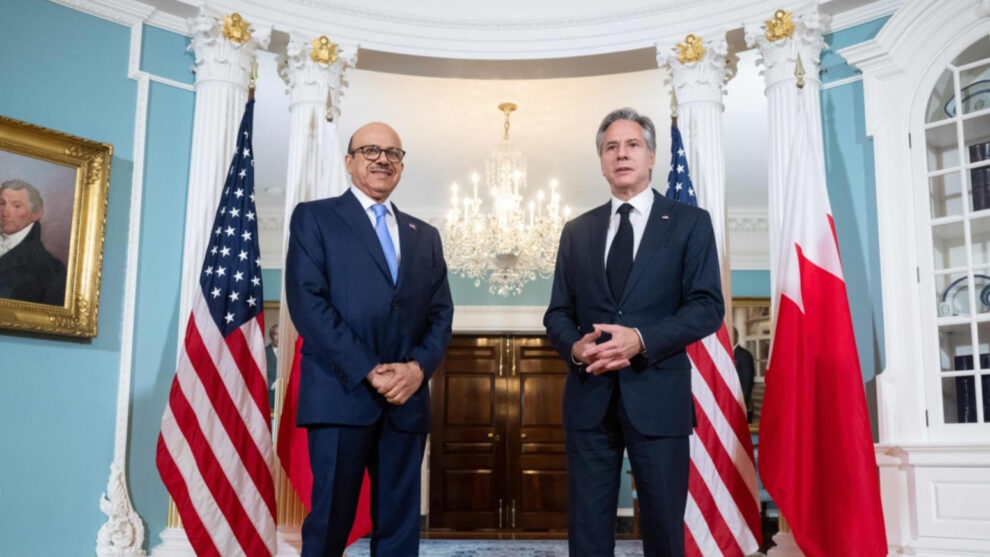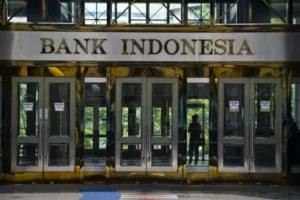The United States and Bahrain signed a strategic security and economic pact Wednesday that the Biden administration hopaes will be a template for strengthening ties with other Persian Gulf countries.
Under the agreement, a year in the making, the United States pledges expanded defense and technology cooperation and intelligence capacity-building. It also outlines Bahrain’s involvement in a new India to Europe rail- and sea-trade corridor via the Middle East. Plans for the trade route were unveiled during President Biden’s visit last week to the G-20 summit in New Delhi.
The Bahrain deal comes as the administration, which came to office leery of Middle East entanglements, has launched a broader effort to tighten relationships there, particularly in the Persian Gulf, to counter similar Chinese and Russian efforts, and strengthen existing defense ties to deter Iran and other would-be aggressors.
Signed by Secretary of State Antony Blinken and visiting Bahraini Crown Prince Salman bin Hamad Al Khalifa, the accord “is a bilateral agreement,” a senior administration official said in a briefing to reporters. “But … it also can serve as a kind of cornerstone for a broader grouping of countries over time that share our common vision on deterrence, diplomacy, economic and security integration, and de-escalation of conflicts.”
The official, speaking on the condition of anonymity under rules set by the White House, also emphasized that the agreement, while “legally binding,” is not a treaty and does not require congressional approval.
“It also does not entail any specific weapons sales,” the official said, although Bahrain, for its size, is already a major purchaser of U.S. defense equipment and hosts the Navy’s 5th Fleet. “We have a very close military relationship with Bahrain … And I think this agreement kind of formalizes that.”
The official said the United States and Bahrain pledged to “work together to help deter and confront external aggression in the event of an attack,” but emphasized that did not amount to a mutual security pact. Rather,“the standard security assurance is that we would immediately consult with our partner and ally, and determine the best way to confront … an ongoing external aggression in that worst-case scenario.”
“But the ultimate objective of agreements like this are to ensure that you never get to that worst-case scenario,” the official said.
Bahrain is the equivalent of low hanging fruit for administration efforts to build an integrated defense, intelligence and deterrence network across the Persian Gulf, encouraging the purchase and use of interoperable U.S. security equipment, and developing a joint strategy for preventing Iranian aggression.
Those long-standing goals largely eluded Biden’s predecessors, as relations with the region’s largest and most dominant country, Saudi Arabia, have waxed and waned. For the past year, through high level visits to Riyadh, the administration has worked to persuade the Saudis to join the Abraham Accords, the Arab-Israeli peace deals achieved by the Trump administration. Bahrain, a small island off the Saudi coast in the Persian Gulf, was one of three initial Arab signers of the accords, establishing diplomatic relations with Israel in 2020 along with the United Arab Emirates.
Significant hurdles remain. The Saudis want a mutual defense treaty with the United States, and approval of plans to construct a full-cycle nuclear power program, including domestic uranium enrichment — both of which are beyond what the administration is ready to give, and would likely encounter stiff resistance in Congress.
Saudi Arabia and the United States both want substantial Israeli progress toward an independent Palestinian state, something that now seems farther than ever from reality under Israeli Prime Minister Benjamin Netanyahu’s extreme right government.
In Wednesday’ssigning ceremony with Salman at the State Department, Blinken emphasized that “we’re looking forward to using this agreement as a framework for additional countries that may wish to join us in strengthening regional stability, economic cooperation and technological innovation.”
As big powers appeal to the developing world with competing visions of what will replace the post-World War II international order, Salman said he believed the accord, officially known as the Comprehensive Security Integration and Prosperity Agreement, “will be the foundation for a new global architecture … It’s an open agreement. We will be welcoming more members, hopefully — that, I think, is as significant as the decisions that were taken after many of the global upheavals historically.”
Blinken said that in meetings this week and beyond, the United States would also “continue our dialogue on the full range of human rights issues which are a core pillar of United States foreign policy.”
In 2011, Bahrain’s ruling Sunni family violently cracked down, with help from Saudi Arabia and the UAE, on demonstrations by the Shiite majority. Hundreds who remain imprisoned launched a hunger strike in early August, demanding better conditions. The strike was suspended Tuesday, on the eve of the ceremony in Washington, after the government agreed to address some of their demands.









